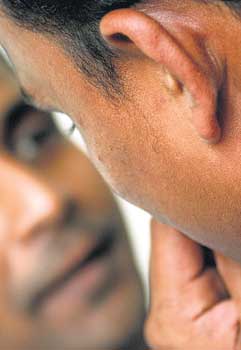Think of the last time you had a conversation with someone. How much of it do you remember? And what strikes you the most – what the other person was saying, or what you yourself had to say?
Too often, we're too interested in the sound of our own voice, to actually listen to someone else. While they talk, we are usually trying to think of what we are going to say next. And thereby missing out on important information that may help us understand the other person, and develop a closer and better relationship with him or her.
Good communication begins with listening skills. "The hardest part of communication is listening," says Theresa Wilson, a Social Worker in Oakville, Canada, who has been working with teenagers for over 20 years. "Active listening is different to just 'hearing.' It means a genuine effort to put yourself in the other person's shoes and see their point of view."
Today, she says, people are communicating in a whole different way. Phone calls, email, and instant messaging have taken the place of face-to-face communication. Without all the nuances of nonverbal communication, such as facial expression and body language, things are more open to interpretation. Also, she points out that young people tend to use shorter and abbreviated language, which gives more room for misunderstanding.
"To communicate well takes time, and technology doesn't really allow for that," says Ms. Wilson, adding that while we accept and learn to understand the new face of communication, we should not become too dependent on it, and lose sight of the benefits of communicating in person. "It's important to occasionally give someone the gift of your presence. There's value in taking time to communicate."
While speaking effectively is an important part of communication, being a good listener is even more so. Good listeners are able to see the world through the eyes of others, and are therefore more understanding, empathetic, and have better problem solving skills. Still, listening doesn't come easily to everyone, and takes sincere effort and practice. What can we do to improve our listening skills?
Be present
Look the other person in the eye, and pay attention to what they are saying. It's often too easy to get distracted, or to start thinking about our next response. This usually reflects in your body language, conveying the message that you are not genuinely interested. Active listening is not about inward thinking – it is about looking at issues from the other person's perspective and actively trying to see his or her point of view.
"Being a good listener doesn't necessarily mean agreeing with everything the other person has to say," says Ms. Wilson, "but you owe them the time to listen and process what they are telling you. Don't use the time while they are speaking to formulate your next argument."
Summarise and repeat
It helps to summarise what the speaker is saying and restate it in your own words, to make sure you have understood. "Using phrases such as 'I think you're saying…' or 'Do you think you're trying to tell me that…' gives reassurance to the speaker that you have understood what he or she is saying, or gives the opportunity to correct you if you haven't," says Ms. Wilson.
Don't interrupt
In other words, no 'yeah, but's!' Hear the other person out before you say your piece. Interrupting conveys the message that you don't value what the other person has to say. It may be tempting to jump in with a similar experience of your own – but it's better to wait until your suggestions or opinions are asked for. And in some cases they may not be! Sometimes people just want to be heard.
It's also important not to criticise, or attack. Be a supportive, open listener. Listening is about creating a caring environment in which the other person feels encouraged by your ability to understand.
Read between the lines
Be alert for things that have been left unsaid or for indications that can help you determine the speaker's true feelings. Watch the facial and body expressions, and the tone of the speaker to try to gather all the information you can, not just the words. A large percentage (studies suggest over 90%) of the meaning we derive from communication, we derive from the non-verbal cues that the other person gives.
Being a good listener can make you a stronger, more caring person. "Its value in terms of how it enhances relationships is invaluable," says Ms. Wilson, "it's the only way you can have true empathy, and appreciate the other person's point of view." Not only will it improve your relationships, it is also one of the keys to success in school or at work. It is also more likely that those you have listened to, will in turn listen to you. Your desire to express should begin with listening well. | 
